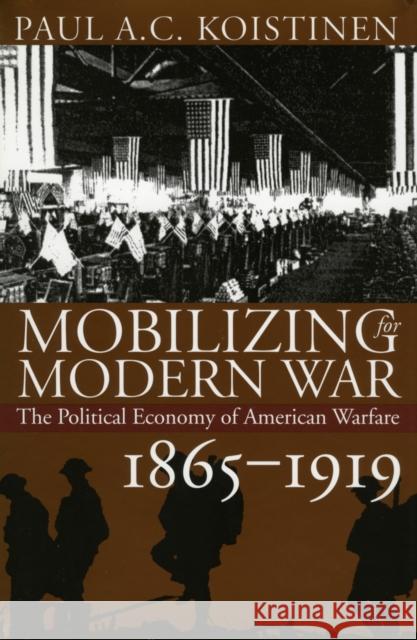Mobilizing for Modern War: The Political Economy of American Warfare, 1865-1919 » książka
Mobilizing for Modern War: The Political Economy of American Warfare, 1865-1919
ISBN-13: 9780700608607 / Angielski / Twarda / 1997 / 408 str.
Mobilizing for Modern War: The Political Economy of American Warfare, 1865-1919
ISBN-13: 9780700608607 / Angielski / Twarda / 1997 / 408 str.
(netto: 232,75 VAT: 5%)
Najniższa cena z 30 dni: 231,74 zł
ok. 30 dni roboczych
Bez gwarancji dostawy przed świętami
Darmowa dostawa!
Although the military-industrial complex became familiar to most Americans during the Cold War, Paul Koistinen shows that its origins actually go back to the dawn of this century. Mobilizing for Modern War, the second of an extraordinary five-volume study on the political economy of American warfare, highlights the emergence of this pivotal relationship. In this volume, Koistinen examines war planning and mobilizing in an era of rapid industrialization and reveals how economic mobilization for defense and war is shaped at the national level by the interaction of political, economic, and military institutions and by increasingly powerful and expensive weaponry.
Covering the Gilded Age and Progressive Era through the Spanish-American War and World War I, Mobilizing for Modern War shows how a partnership evolved between government and business to prepare for and conduct modern warfare. This partnership was an extension of Progressive regulatory reforms, but it had to include a professionalized army and navy in order to handle the new technology of war. Koistinen traces the origins of the military-industrial complex to the emergence of a modern navy at the turn of the century, when building a new fleet of steel, armor, and ordnance required a production team of political leaders, naval officers, and businessmen. A similar team was brought together again between 1915 and 1918 as the War Industries Board to mobilize the economy for World War I, and it became the model for subsequent industrial mobilization planning. Koistinen shows how mobilizing for World War I left an indelible imprint on twentieth-century life. By accelerating the emerging Progressive political economy, it strengthened the cooperative planning ethic within business and government and introduced the concept of industrial preparedness, carried out largely under military leadership. Relating events of this period to what preceded and followed, Koistinen convincingly argues that in this century warfare has shaped the nation's social institutions and ideology even more than reform. Mobilizing for Modern War is marked by outstanding research and cogent analysis and yields fresh insights not only about the conduct of conflict, but also about war's effects on peacetime affairs.










